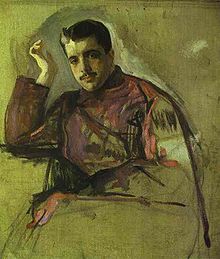A little later today I’ll be heading down to Philadelphia for the final dress rehearsal of Danse Russe. Things have been going very well all week long, and Paul Moravec and I expect Thursday’s premiere to go at least as well, if not better. That’s a wonderful feeling–and a reassuring one. Anybody who tells you that a bad dress rehearsal means a good opening night knows nothing about theater.
The experience of bringing my second opera to the stage has been quite different from that of rehearsing The Letter in Santa Fe two years ago. The Letter opened in July, and I took a full month off from my day job at The Wall Street Journal to attend rehearsals (though I only skipped a single drama column–I saw several long-running summer festival shows before flying out to Santa Fe and reviewed them while I was there).
Danse Russe, by contrast, went into rehearsal at the height of the busiest Broadway season in years, and there was no way that I could escape to Philadelphia until I’d seen all the shows I had to see. I went to five previews in a row last week, two of them on Saturday. (Seeing two musicals in one day is not a good idea, Mrs. Worthington.) Then, on Monday, I got up at seven in the morning and spent nine hours writing three Wall Street Journal drama columns, after which I took the next train to Philadelphia, arriving just in time for the piano dress of Danse Russe. It was the first time that I’d seen the entire piece performed on stage from start to finish, and I was so busy scrawling down notes for the singers that I barely had time to register the impact of seeing it.
 Only once was I fully present in the emotional moment, and that was when I heard the new aria for Sergei Diaghilev that Paul and I wrote a couple of months ago after seeing a workshop performance of the next-to-last draft of Danse Russe. Paul had called me from Philadelphia on Saturday to tell me that the aria really worked, but I had to take his word for it: I’d never heard it sung, only “played” in a synthesized version on my laptop. Hearing and seeing my words sung from the stage bowled me over–though not for long. The rehearsal continued, and in mere seconds I was caught up once more in the controlled frenzy that is a dress rehearsal.
Only once was I fully present in the emotional moment, and that was when I heard the new aria for Sergei Diaghilev that Paul and I wrote a couple of months ago after seeing a workshop performance of the next-to-last draft of Danse Russe. Paul had called me from Philadelphia on Saturday to tell me that the aria really worked, but I had to take his word for it: I’d never heard it sung, only “played” in a synthesized version on my laptop. Hearing and seeing my words sung from the stage bowled me over–though not for long. The rehearsal continued, and in mere seconds I was caught up once more in the controlled frenzy that is a dress rehearsal.
On the train to New York that night, I thought of the scene from Bull Durham in which Tim Robbins, the hot young rookie pitcher, trots proudly into the dugout after pitching a fantastic inning. He says, “I was great, huh?” But Kevin Costner, the veteran catcher who’s trying to prepare him for the big leagues, isn’t having any of it. He says, “Your fastball was up and your curveball was hanging. In the show they would’ve ripped you.” Robbins asks, “Can’t you let me enjoy the moment?” And Costner replies, “The moment’s over.”
That’s the way it goes, at least in my experience. Not until Thursday’s premiere will I be able to savor Danse Russe, and even then I’ll probably be so preoccupied with the nuts and bolts of the performance that I won’t really experience it. If I’m lucky, I’ll be able to relax on Friday and Saturday and see the show the way the audience sees it. Or not. After all, it isn’t my job to enjoy Danse Russe. That’s your job, should you feel so moved. My job is to help make it all happen. Pleasure is optional–for now.
* * *
Danse Russe opens on Thursday at Philadelphia’s Kimmel Center for the Performing Arts. For more information, go here.
Archives for April 27, 2011
TT: Apropos of Danse Russe (III)
Igor Stravinsky conducts the Toronto Symphony in a 1967 rehearsal for a performance of his Pulcinella Suite. Stravinsky composed the score for The Rite of Spring in 1913 and is a character in Danse Russe:
TT: Almanac
“My music is best understood by children and animals.”
Igor Stravinsky (quoted in The Observer, Oct. 8, 1961)
